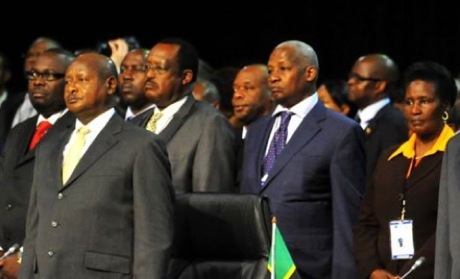Gen. Museveni, foreground; Kutesa is the fourth person from Museveni
Citing confidendiality, U.S. officials won’t reveal whether Uganda’s President Yoweri Museveni and his foreign affairs minister Sam Kutesa are on the list of officials from the East African country who are now barred from entering the country in connection with the country’s anti-Gay law and corruption.
The White House on Thursday announced sanctions on Uganda and visa restrictions on selected officials whose names won’t be publicly disclosed.
Officials close to the Ugandan regime believe that as U.S. sanctions escalate the government will quickly scrap its anti-Gay law by allowing a court there to rule that it’s unconstitutional. The Uganda courts are packed with judges handpicked by the country’s long-time ruler of 28 years and many rulings are pre-determined. A case was filed in the Constitutional Court challenging the law soon after it was signed and some analysts believe the it had a wink of approval from Gen. Museveni, the cunning Ugandan ruler.
The foreign affairs minister himself, Kutesa, is the subject of an online campaign to bar him from the U.S.; he was elected June 11 as President of the United Nations General Assembly.
Kutesa was censured by Uganda’s Parliament for corruption in 1999 and has also been accused of involvement in several other massive theft scandals, including embezzlement of hundreds of millions of dollars allocated to host the 2007 Commonwealth Heads of Government Meeting (Chogm) in Uganda. The U.K. had also considered a visa ban on Kutesa as a result of the alleged Commonwealth funds theft. Kutesa additionally was accused in Parliament of accepting millions of dollars in bribes from a foreign oil company.
A former U.S. ambassador to Uganda, Jerry Lanier, in a confidential memo dated Jan. 13, 2010 to the State Department and the CIA, which was later published by Wikileaks, wrote that “we regard Kutesa’s corruption” as “egregious.” In a subsequent memo Lanier said Kutesa was one of three cabinet ministers Gen. Museveni wouldn’t hold accountable for corruption. Even at his new post at the UN Kutesa now faces a conflict of interest situation.
The online campaign to bar Kutesa’s U.S. entry now has 14,724 signatures.
On Feb. 24, the ruler, Gen. Museveni signed Uganda’s Anti-Homosexuality Act into law and it includes life-in-prison for people in same-sex relations and prison time of up to seven years for people who don’t report Gay people to the police or authorities. At the time he signed the law he referred to Gay people as “disgusting” in an interview broadcast on CNN, which some people considered amounted to incitement to violence. Since the anti-Gay bill was enacted in December an article in The Guardian reports that attacks on the LGBT community increased to 162 between December 2013 and May 2014 compared to only 8 for the entire period from January to December, 2013.
It’s unclear if the new U.S. visa restrictions on Ugandan officials affects Gen. Museveni. He is one of 48 African leaders who have been invited to attend the White House- Africa Leaders Summit on August 5 and 6, in Washington. He is the one who ultimately signed Uganda’s anti-Gay law.
While being debated in Uganda’s Parliament, the bill had called for death by hanging for Gays and President Obama referred to it as “odious.” A tabloid newspaper also published photographs of Ugandans alleged to be Gay and called for their hanging on front page headlines.
On Thursday the National Security Council released a statement that read the “Department of State is taking measures to prevent entry into the United States by certain Ugandan officials involved in serious human rights abuses, including against LGBT individuals.”
“In addition, the United States will take steps, consistent with current authorities, to prevent entry into the United States by Ugandans who are found responsible for significant public corruption,” the statement said.
Other U.S. measures announced Thursday include canceling a military training exercise with the East African nation and “discontinuing or redirecting funds” that had been marked for the Ugandan Police Force, the Ministry of Health, and the National Public Health Institute.
Asked whether Kutesa was on the new U.S. sanctions list of barred Ugandan officials, a spokesperson at The White House referred The Black Star News to the State Department where a spokesperson said the names on the list are secret and can’t be revealed.
“In line with confidentiality requirements, I cannot identify the individuals whom we have watch-listed,” the spokesperson said, in an e-mail message response. “In general the new visa restrictions apply to those specific Ugandan individuals for whom there is evidence that they participated in serious abuses of human rights—including, in some cases, abuses against LGBT persons. In addition we will take similar steps with respect to individuals found responsible for acts of significant public corruption.”
The spokesperson declined to say whether Kutesa would be affected by the visa ban as a result of his corruption scandals and ambassador Lanier’s observations. He also cited confidentiality when asked if Gen. Museveni would be able to attend the August White House summit.
“It is also important to note that the UN Headquarters Agreement obligates the United States, as host to the UN, to grant diplomatic visas to government officials traveling to New York on official UN business,” the spokesperson added. The U.S. position appears to open a door for Kutesa provided he limited his U.S. travels to New York, a lawyer not involved in the case, observed.
The opening may not apply to Gen. Museveni’s Washington trip however, he noted.
Additionally two separate bills recently introduced, one in the Senate and one in Congress, would bar foreign officials involved in LGBT discrimination from entry into the United States.












